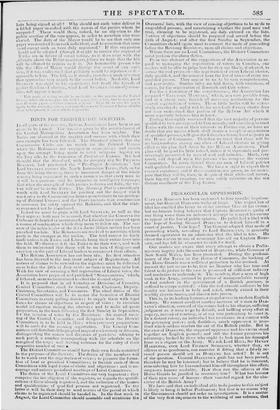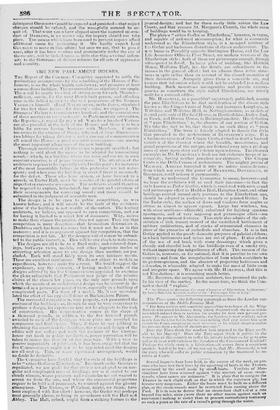PROCONSULAR OPPRESSION.
CAPTAIN ( »II N has been sentenced to four months' imprison- ment, but General Daum No walks at lorge. Tlm unjust law of libel hits enubled the latter to so ike ateoner blow at his victim: but no human being believes that Captaia RootsoN is guilty of any thing worse than an indiscreet attempt to compel his enemy to appear at the bar of public opinien. lle !Mailed a libel with the hope of forcing General DARLING to dellool himself in a court of justice. Vain hope ! The General adopted that mode of proceeding which, according to Lord Blume:: I A M, is generally-
deemed equivalent to an admission that the libel is true. He chose the certain means of revenging himself' on Captain Rom- soso and has left his character to shift for itself.
Our readers are aware that every attempt to obtain a Parlia- mentary inquiry into the conduct of avan NG, while Governor of New South Wales, has beet' frustrated. During the predomi- nance of the Tories in the House of Commons, die backing of the Horse Guards was a sufficient protection to the accused. At present the fact seems to be, that 110 Member who has time and talent to du justice to the case is possessed of sufficient industry and resolution to undertake it. The result is, that a nom of high rank in the Army, accused by parties of unimpeachable veracity of foul conduct in the government of a British province, is suffered to escape untried: while the unfortueate sufferers by his enmity are harassed in body and mind, utterly ruined in their worldly cilcum,tances, and thrown into prison. This is, in its leading fatures, a singular case in modern English history. We cannot recollect another instance of a man in DAR• LING'S situation, accused of the crimes laid to his charge, suffering judgment as it were to go by default, and Willing every effort at itopory, instead of courtiug, or at any rate pretending to court it. In a distant colony, an individual has no chance in a contest with the governing power; and, doubtless, much oppression is prac- tised which seldom reaches the car of the British public. But in the case of DARLING, the SUppOzell oppressor and his victim stand together on English ground ; and still the former preserves his advantage, backed by those who ought to look upon his damaged finite as a stigma on the Army. We ask Lord Him., Sir HENRY IIARDINGE, even Lord FITZROY Somatisior, whether they, as officers or as gentlemen, can conceive it fitting that a falsely ac- cused person should act as DARLING has acted? It is out of the question. General DanniNe's guilt has not been proved, therefore he may be innocent; but to believe that he is innecent, remembering how lie has conducted himself throughout this affair, surpasses human credulity. Dow then can the officers at the Horse Guards be justified in screening him ? What has become of their [live sense of honour—their vaunted regard for the cha- racter of the British Army? We have said that no individual able to do justice to this subject is likely to bring it before Parliament; but that is no reason why the Government should not order an investigation. It is a matter of the very first imkortal:ce to the wellbeing of our colonies, that delinquent Governors s'nould he exposed aed punished—that unjust vharges should be t efeted, and the wrongfully accused be ac- quit ed. That some veess have elapsed since the imputed miscon- duct of Deludes:, is tie reasne why the inquiry should not hike
place. The mettle; leave liven used to prevent inquiry ;Abut additional cause the institutive; it. We hardly expect Lord
GIA,NELG to move in this affair ; but sure we are, that to pass it llVer, alter it has beer often nod proniinently under the eye of the coentr , will he looked upon as little else than a virtual indent- aitv to 11w Governors of distant colonies for all acts of oppression and rascality.



























 Previous page
Previous page